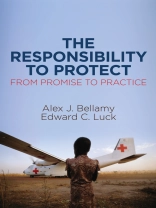In 2005, the international community made a landmark commitment to prevent mass atrocities by unanimously adopting the UN’s ‘Responsibility to Protect’ (R2P) principle. As often as not, however, R2P has failed to translate into decisive action. Why does this gap persist between the world’s normative pledges to R2P and its ability to make it a daily lived reality?
In this new book, leading global authorities on humanitarian protection Alex Bellamy and Edward Luck offer a probing and in-depth response to this fundamental question, calling for a more comprehensive approach to the practice of R2P – one that moves beyond states and the UN to include the full range of actors that play a role in protecting vulnerable populations. Drawing on cases from the Middle East to sub-Saharan Africa and Southeast Asia, they examine the forces and conditions that produce atrocity crimes and the challenge of responding to them quickly and effectively. Ultimately, they advocate both for emergency policies to temporarily stop carnage and for policies leading to sustainable change within societies and governments. Only by introducing these additional elements to the R2P toolkit will the failures associated with humanitarian crises like Syria and Libya become a thing of the past.
Tabla de materias
Acknowledgements
Introduction
1. R2P as Principle and Policy
2. R2P in World Politics
3. Unexpected Challenges and Opportunities
4. In Search of the International Community
5. The Domestic Dimensions
6. The Challenge of Prevention
7. Making a Difference: Lessons from Experience
Conclusion
Sobre el autor
Alex J. Bellamy is Director of the Asia Pacific Centre for the Responsibility to Protect and Professor of Peace and Conflict Studies at the University of Queensland.w
Edward C. Luck is Arnold A. Saltzman Professor of Professional Practice and Director of the Specialization in International Conflict Resolution, School of International and Public Affairs, Columbia University.












